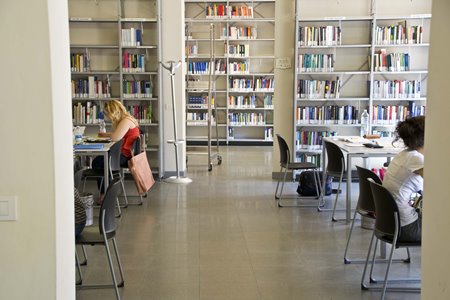BIBLIOTECA DI ECONOMIA

Opening hours
-
Orario servizio di prestito
01/01/2024 - 22/12/2024
Monday 09:00 / 14:00 Tuesday 09:00 / 17:00 Wednesday 09:00 / 14:00 Thursday 09:00 / 17:00 Friday 09:00 / 14:00 Saturday closed Sunday closed
Closing days
-
Festa del patrono
23/04/2024 - 23/04/2024 -
Ponte 25 Aprile
26/04/2024 - 26/04/2024 -
Chiusura estiva
05/08/2024 - 16/08/2024 -
Festività natalizie
23/12/2024 - 03/01/2025
News from the library
There are no news currently
Address
VIA VOLTAPALETTO, 1144121 FERRARA
Contacts
Tel.: 0532 455014
E-Mail: biblioteca.economia@unife.it
Library services
Wi-Fi: Rete universitaria
Access for disabled people: Partial access. Non accessibile solo il Ballatoio all'interno del piano Secondo
Staff
Other informations
| History in brief The library occupies four floors of Palazzo Bevilacqua Costabili's east wing, prestigious new location of the Faculty of Economics. Established in the 15th century, but extended and remodelled until the entire 18th century, the palace is characterised by its vastness and the grateness of its façade; it has been the object of a long and accurate restoration, it balances the requirements of artistic-architectural preservation and the functional requirements of the new destination. The first centre of the Economics Library is found in the "Cabinet of Statistics" Fund established at the beginning of the century at the Faculty of Law. The successive designations - 'Institute of Public Finance' from 1945, 'Institute of Economics and Finance' from 1955 to 1997 and finally 'Department of Economics Institutions Territory' - reflect both the growth of the teaching and research structure and the development and specialisation of the Library up to its current appearance. |
| Collection The bibliographic areas most often covered are political economy, business economics, public and local finance, statistics, history of economic thought, tax law, economics and politics of the European Communities. |




